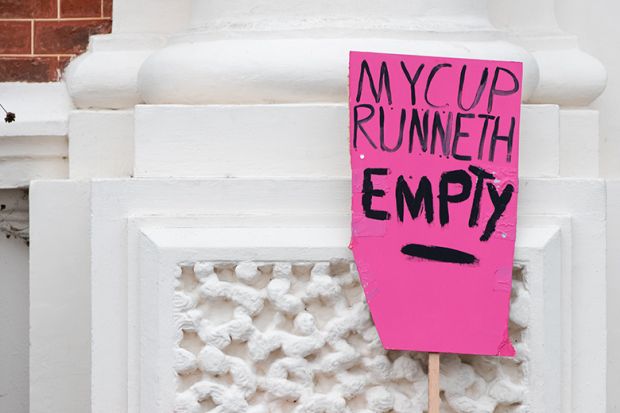Dozens of external examiners for Queen Mary University of London have resigned after management said that it would withhold lecturers’ pay until they make up for classes cancelled due to strike action.
Earlier this year, the university told lecturers that it would withhold 100 per cent of their pay indefinitely if they do not reschedule classes that would have taken place during ongoing strike action over reduced pensions.
The ultimatum was seen as especially “punitive” amid a tense few years between UK universities and staff, who have gone on strike, or taken action short of strike – including cancelling classes – numerous times in that period.
By 18 February, 31 external examiners for QMUL had quit their posts, according to the University and College Union. This includes all six examiners for its history department, a faculty member said.
Responsible for overseeing the quality of exams, external external examiners are seen as necessary to award degrees. Their mass resignation puts the university in a tough spot with students looking to graduate in spring, said Yvette Russell, associate professor of law and feminist theory at the University of Bristol, who was the first to resign her post as QMUL examiner.
“Degrees can’t be awarded without this – hundreds of students [I oversee] will be affected,” she said. “If it were just me going from the law school, they could probably work it out, but when you write that on a much bigger scale, it becomes a much bigger problem for the institution. They might not be able to say they’ve met quality assurance.”
Dr Russell, who quit her post on 3 February, said she did so in solidarity with QMUL colleagues facing a pay freeze amid “unimaginable workloads” and the prospect of severely slashed pensions.
“Queen Mary has taken the most punitive position” by withholding pay until faculty make up for missed classes, she said. “I find the vindictiveness of it extraordinary.
“It’s become a very nasty dispute…I have a lot of friends and colleagues who work at Queen Mary – the tone of threats coming from that management team were of a different calibre than what we’ve seen before.”
A lecturer at the university, who asked not to be named for fear of “bullying” by the administration, decried the “reputational and functional damage” and management’s actions “jeopardising our reputation and imperilling our position in the Office for Students’ regulatory framework”.
Still, she said it was “heartening to know experts in other institutions do not join in that punitive and risky game”.
The academic said it would be “heart-breaking” if the management’s stance caused a delayed graduation for students.
“Staff, both academic and professional, have worked at 200 percent throughout the pandemic and through an increasingly volatile…situation to ensure that our students receive continued and high-quality education. We want our students to be able to celebrate that achievement that we worked towards together,” she said.
A spokesman for the university declined to say whether it would be able to award all degrees in spring if it could not resolve the issue, but reiterated its stance.
“Queen Mary does not accept partial performance,” he said. “A failure to reschedule and deliver all cancelled planned education activities will amount to a breach of contract and partial performance, and 100 percent of pay will be deducted until that education activity is rescheduled within acceptable timescales.”
He stressed that that the university leadership was “concerned” for students facing disruption to their learning.
“Our first priority will always be to protect our students’ education and experience…this is why we will reasonably ask staff…to prioritise all education activity above all other contractual activities that they may otherwise choose to do, including any research, conferences and sabbaticals,” he said.
Register to continue
Why register?
- Registration is free and only takes a moment
- Once registered, you can read 3 articles a month
- Sign up for our newsletter
Subscribe
Or subscribe for unlimited access to:
- Unlimited access to news, views, insights & reviews
- Digital editions
- Digital access to THE’s university and college rankings analysis
Already registered or a current subscriber? Login






